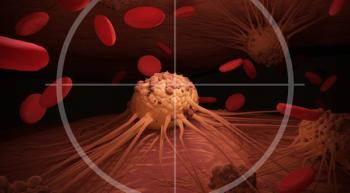
The senator's family announced that he will no longer be undergoing treatment for glioblastoma.

Brielle Benyon, Assistant Managing Editor for CURE®, has been with MJH Life Sciences since 2016. She has served as an editor on both CURE and its sister publication, Oncology Nursing News. Brielle is a graduate from The College of New Jersey. Outside of work, she enjoys spending time with family and friends, CrossFit and wishing she had the grace and confidence of her toddler-aged daughter.
Follow Brielle on Twitter @Brielle_Benyon.

The senator's family announced that he will no longer be undergoing treatment for glioblastoma.

"One of the big challenges in lymphoma is that many immune cells are present right in the tumor, but somehow those immune cells are not actually killing the tumor cells," explained Stephen M. Ansell, M.D., Ph.D.

According to a recent study conducted at the University of Alabama at Birmingham Schools of Public Health and Medicine, disparities among patients who receive instructions for this follow-up care still exist.

In this week's episode, state senator Eli D. Bebout discusses his two bouts with cancer, and how his health struggles influenced his politics.

In recent decades, researchers have gained a much better understanding of how gynecologic cancers develop, especially for women who carry genetic mutations.

A common goal for palliative care is pain management, where opioids like morphine are often on the frontline. Then, practitioners may build on medications from there, adding agents such as gabapentin and tricyclic antidepressants. But if those don’t work, Christopher J. Pietras, M.D. said that ketamine may be an option.

While the treatment landscape of mantle cell lymphoma (MCL) has continued to evolve in recent years, researchers and clinicians alike are still at a loss for curative strategies. But immunotherapy may help.

The Food and Drug Administration (FDA) updated the prescribing information for two immunotherapy agents – Keytruda (pembrolizumab) and Tecentriq (atezolizumab) – approved to treat patients with locally advanced or metastatic bladder cancer who are not eligible for cisplatin-based therapy.

This is the first approval in the small cell lung cancer space in nearly two decades.

The Food and Drug Administration (FDA) approved Lenvima (lenvatinib) for the firstline treatment of patients with unresectable hepatocellular carcinoma (HCC).

Researchers noted that melanoma diagnosis and treatment did not cause many women to put off becoming pregnant.

In recent years, immunotherapy has been falling flat in the brain cancer field, but recent research may change that.

A patient's bone health history may offer clues into their myeloma outcomes, according to a recent study.

Dewayne Johnson, a patient with cancer who claimed that Monsanto’s Roundup product was at the root of his non-Hodgkin lymphoma diagnosis in 2014, was awarded $289 million by a jury, as reported by the Associated Press.

Understanding these outcomes is important in planning treatments and mitigating the possibility of patients stopping their treatment.

A new treatment has been approved to treat two rare forms of non-Hodgkin lymphoma.

Clinical trials are starting to focus more on the tumor's genetic makeup than the tumor's location.

With five immunotherapy drugs approved in the bladder cancer space, the next question researchers find themselves asking is whether these drugs would work better alone or as part of a combination for patients with metastatic disease.

Researchers are on the hunt for a better biomarker in ovarian cancer that could detect the disease in earlier stages.

"The objective is to equip the research and drug development communities with the data needed to move better MPN treatments, and potentially, cures, through the discovery pipeline more quickly."

Today's approval of Tibsovo, along with the diagnostic tool to determine who should get it, brings a new type of treatment for patients with acute myeloid leukemia.

While head and neck cancer is more common in men than in women, women may actually be less likely to receive aggressive treatment for the disease, which could affect outcomes.

An expert discusses ways to complement cancer treatment and potentially improve outcomes.

Thanks to two pilot programs, the FDA was able to more efficiently approve Kisqali for certain patients with advanced breast cancer.

While there are known risk factors of developing acute myeloid leukemia (AML) – such as a myelodysplastic syndrome diagnosis and receiving chemotherapy and radiotherapy – a diagnosis can still stun and individual. But researchers at Weill Cornell Medicine and New York-Presbyterian recently discovered a genomic pre-malignant biomarker of the disease that can identify people who are at a greater risk for AML.

Researchers reviewed the cases of more than 20,000 women – some who went on to develop ovarian cancer, and some who didn’t – and found that there was a small, but statistically significant increase in ovarian cancer incidence in women who reported having severe menstrual pain.

Many questions still remain in the treatment of localized bladder cancer, like which patients are best suited to receive neoadjuvant (pre-surgery) chemotherapy – a procedure that could be beneficial to many, but comes with increased toxicity.


Thanks to targeted drugs and evolving research, women who experience recurrences of ovarian cancer have more treatment options than they did in the past..

New treatments are continually being explored as researchers use genetic testing and genomic sequencing to better understand characteristics of ovarian cancer that can be targeted with drugs.